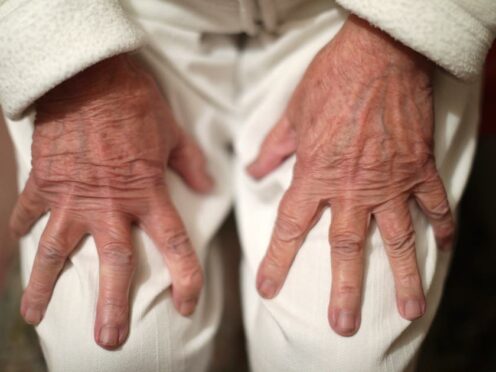Heart health could be the biggest risk factor for future dementia rates, new research suggests.
Compared with factors such as smoking and having less education, dementia risk factors associated with heart health may have increased over time, according to the study.
The findings indicate that action targeted more towards cardiovascular health may help to prevent future cases of dementia.
An estimated 944,000 people in the UK live with dementia and data suggests more than half of the adult population knows someone who has been diagnosed with a form of the disease.
In the new study, UCL researchers analysed 27 papers, involving people with dementia across the world with data collected between 1947 and 2015.
Using the data, they calculated what proportion of dementia cases were attributable to various risk factors over time.
The condition usually develops because of a combination of genetic and environmental factors, including high blood pressure, obesity, diabetes, education and smoking.
The team found that obesity and diabetes rates have increased over time, as has their contribution to dementia risk.
Additionally, over time, having less education and smoking had become less common, and was associated with a decline in rates of dementia.
Lead author Dr Naaheed Mukadam, of the UCL Division of Psychiatry, said: “Cardiovascular risk factors may have contributed more to dementia risk over time, so these deserve more targeted action for future dementia prevention efforts.
“Our results show that levels of education have increased over time in many higher income countries, meaning that this has become a less important dementia risk factor.
“Meanwhile, smoking levels have also declined in Europe and the USA as it has become less socially acceptable and more expensive.”
Dr Mukadam added that the findings suggest interventions in the population could “significantly” affect the occurrence of risk factors, and governments should consider implementing schemes such as worldwide policies of education, and restrictions on smoking.
The researchers found that high blood pressure remained the greatest dementia risk factor in most of the studies they reviewed; however they said it is worth noting that proactive management of the condition has also increased over time.
The study, published in The Lancet Public Health, was funded by the National Institute for Health and Care Research (NIHR) Three Schools’ Dementia Research Programme.
It is estimated that 50 million people across the world now living with dementia, and by 2050 this is set to triple to 152 million, according to Alzheimer’s Research UK.
Dr Isolde Radford, senior policy manager at the charity, said: “This new analysis says it loud and clear – that managing high blood pressure and keeping our hearts healthy is playing an important role in reducing our risk of developing dementia.
“With no treatments currently available in the UK that can stop or slow the diseases that cause dementia, there has never been a more pressing need for looking after our brain health to help reduce the future risk of developing dementia.
“Evidence tells us that what’s good for our hearts is good for our brains, and this new research underlines the importance of this message.
“So, things like eating a healthy balanced diet and staying physically active can all help people to reduce their risk of dementia.
“But just one in three people know they can reduce their risk of developing dementia and there are many factors such as income and ethnicity that affect our ability to do so.
“That’s why it’s vital the next UK government takes steps to help make healthy lifestyles as achievable as possible for everyone.”
